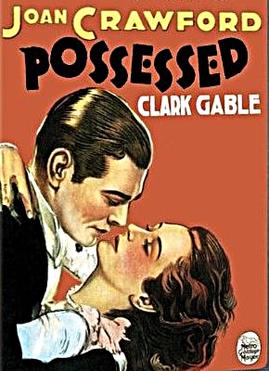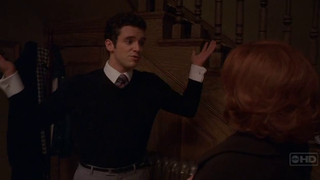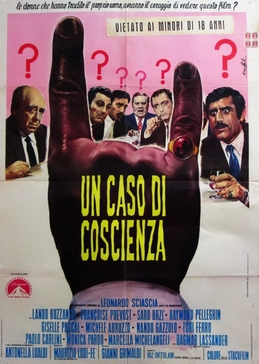Related Research Articles
Cellular is a 2004 American action thriller film directed by David R. Ellis. The film stars Kim Basinger, Chris Evans, Jason Statham, William H. Macy with Noah Emmerich, Richard Burgi, Valerie Cruz and Jessica Biel. The screenplay was written by Chris Morgan, based on a story by Larry Cohen.

Bradley Branning is a fictional character from the BBC soap opera EastEnders, played by Charlie Clements. He made his first appearance on screen on 24 January 2006 and last appeared on 22 February 2010 after he was killed-off in the show's live 25th anniversary. Clements won multiple awards for his portrayal.

Christine Hewitt is a fictional character from the BBC soap opera EastEnders, played by Elizabeth Power. Introduced in 1992 as a lonely divorcée, she becomes besotted with married Arthur Fowler while he tends her garden. She leaves in 1993 once her affair with Arthur is discovered by his wife Pauline.

Possessed is a 1931 American pre-Code drama film directed by Clarence Brown, starring Joan Crawford and Clark Gable and released by Metro-Goldwyn-Mayer. The film is the story of Marian Martin, a factory worker who rises to the top as the mistress of a wealthy attorney. The screenplay by Lenore J. Coffee was adapted from the 1920 Broadway play The Mirage by Edgar Selwyn. Possessed was the third of eight film collaborations between Crawford and Gable.

"Don't Ask, Don't Tell" is the 18th episode of the dramedy series Ugly Betty, which aired in the US on March 22, 2007. The episode was co-written by Marco Pennette, Veronica Becker and Sarah Kucserka and directed by Tricia Brock. The episode's title refers to the United States' "Don't ask, don't tell" military policy.

Hellphone is a 2007 French comedy horror film co-written and directed by James Huth and starring Jean-Baptiste Maunier, Jean Dujardin and Édouard Collin.

Penthouse is a 1933 American Pre-Code crime film starring Warner Baxter as a lawyer and Myrna Loy as a call girl who helps him with a murder case. The film features Charles Butterworth as the butler, Mae Clarke as the murder victim, Phillips Holmes as the suspected murderer, and C. Henry Gordon as the gangster who arranged the murder. It was directed by W. S. Van Dyke and written by Frances Goodrich and Albert Hackett, based on a novel by Arthur Somers Roche. The film was later remade as the more sanitized Society Lawyer (1939), without the risqué pre-Code dialogue.

A Letter for Evie is a 1946 American comedy film directed by Jules Dassin and starring Marsha Hunt, John Carroll and Hume Cronyn. It was produced by Metro-Goldwyn-Mayer. The story is a spinoff of Cyrano de Bergerac, updated to a modern setting.

She's Out of My League is a 2010 American romantic comedy film directed by Jim Field Smith in his feature directorial debut, and written by Sean Anders and John Morris. It stars Jay Baruchel as an average man who begins a relationship with a very attractive woman, played by Alice Eve, and is warned by his friends that it is doomed to fall apart because of their differing appearances. T.J. Miller, Mike Vogel, Nate Torrence, Krysten Ritter, Geoff Stults, and Lindsay Sloane also star.

Beyond the Clouds is a 1995 Italian-French-German romance film directed by Michelangelo Antonioni, with contributions by Wim Wenders, and starring John Malkovich, Sophie Marceau, Vincent Perez, Irène Jacob, Fanny Ardant, Jeanne Moreau, Peter Weller, Marcello Mastroianni, and Jean Reno. The film consists of four stories of romantic love and illusion told from the perspective of a wandering film director. In the first story, two beautiful young lovers are unable to consummate their passion because the young man desires impossible perfection. In the second story, the director makes love to a young woman who reveals that she murdered her father. In the third story, a man makes an effort to appease both his wife and his mistress. In the fourth story, a young man is infatuated with a girl who is about to enter a convent. This was the final feature-length film by Antonioni before his death in 2007.

Killjoy 2: Deliverance from Evil is a 2002 American slasher film and sequel to Full Moon's horror movie, Killjoy.

Waterfront Lady is a 1935 American film directed by Joseph Santley and starring Ann Rutherford, in her feature film debut, and Frank Albertson.

The Magnificent Dope is a 1942 American comedy film released by 20th Century Fox. It is also known as Lazy Galahad, Strictly Dynamite and The Magnificent Jerk.

Negan is a character in the comic book series The Walking Dead, its self-titled television adaptation, and its spin-off series Dead City. He was the leader of the Saviors, a group of survivors in the Sanctuary that oppresses other survivor communities and forces them to pay tribute to him. In the comics, the character's appearance is based on Henry Rollins, as confirmed by Charlie Adlard. Jeffrey Dean Morgan portrays Negan in the television series, having first appeared in the sixth-season finale.

Un caso di coscienza is a 1970 Italian comedy-drama film written and directed by Giovanni Grimaldi. It is based on the Leonardo Sciascia's short story with the same name, which is part of the collection Il mare colore del vino.
Le Songe d'une nuit d'été is a French TV film from 1969. It is based on A Midsummer Night's Dream by William Shakespeare, and was directed by Jean-Christophe Averty.
"Follow the White Rabbit" is the sixth episode of the third season, and 50th episode overall from the Fox series Gotham. The episode was written by co-executive producers Steven Lilien and Bryan Wynbrandt and directed by Nathan Hope. It was first broadcast on October 24, 2016. In the episode, Jervis Tetch begins to formulate a plan to lure out Gordon to him by the use of many people involved. Gordon is beginning to be aided by a white-suited man, the White Rabbit, in order to find Tetch, who's waiting for him to arrive and exact his revenge for Alice's death. Meanwhile, Cobblepot is ready to confess his love for Nygma, when Nygma finds someone close to him.

Don't Talk to Strange Men is a 1962 black and white British 'B' crime thriller film directed by Pat Jackson and starring Christina Gregg, Janina Faye, Cyril Raymond and Gillian Lind. The screenplay was by Gwen Cherrell.

Four Sisters Before the Wedding is a 2020 Filipino family comedy-drama film directed by Mae Cruz-Alviar, produced by Star Cinema and SCX. It serves as both a prequel and a sequel to the 2013 film, Four Sisters and a Wedding. It premiered on December 11, 2020, via KTX, iWant TFC, Sky Cable PPV, Cignal PPV as well in SM Cinemas and CityMall Cinemas in select modified general community quarantine areas.
References
- 1 2 Isherwood, Charles (March 5, 2008). "A Nagging Call to Tidy Up an Unfinished Life". The New York Times. Retrieved May 8, 2013.
- 1 2 Jones, Kenneth. "DC Hayes Winners Include Dead Man's Cell Phone, Macbeth, Reefer Madness, Irwin, Kudisch". playbill.com. Archived from the original on June 25, 2014. Retrieved May 8, 2013.
- ↑ Jones, Kenneth. "Sarah's Ruhl's 'Dead Man's Cell Phone' Begins World Premiere at D.C.'s Woolly Mammoth" playbill.com, June 4, 2007
- ↑ Dead Man's Cell Phone Listing" Archived May 13, 2019, at the Wayback Machine Internet Off-Broadway Database, retrieved May 13, 2019
- ↑ Jones, Kenneth. "Dead Mans Cell Phone Makes NYC Premiere Mary Louise Parker Answers Call". Playbill. Archived from the original on October 21, 2012. Retrieved May 8, 2013.
- ↑ "NYC Premiere of Dead Man's Cell Phone Opens March 4". March 4, 2008.
- ↑ Cooper, Neil (June 10, 2011). "Dead Man's Cell Phone, The Arches, Glasgow". The Herald Scotland. Retrieved May 8, 2013.
- ↑ " Dead Man's Cell Phone Listing" thearches.co.uk, accessed October 9, 2014
- ↑ Hurwitt, Robert. "Theater review: 'Dead Man's Cell Phone'" sfgate.com, May 11, 2009